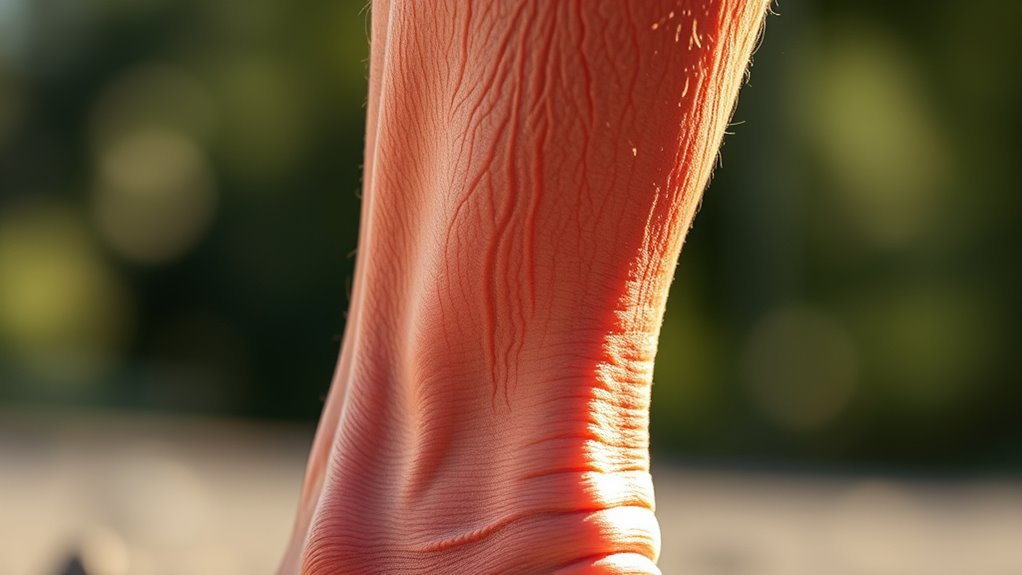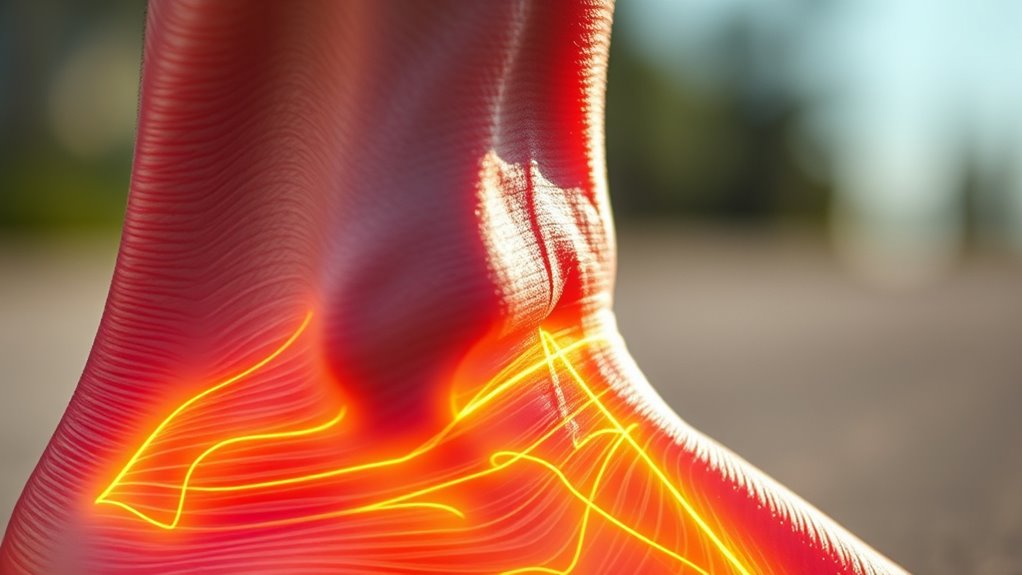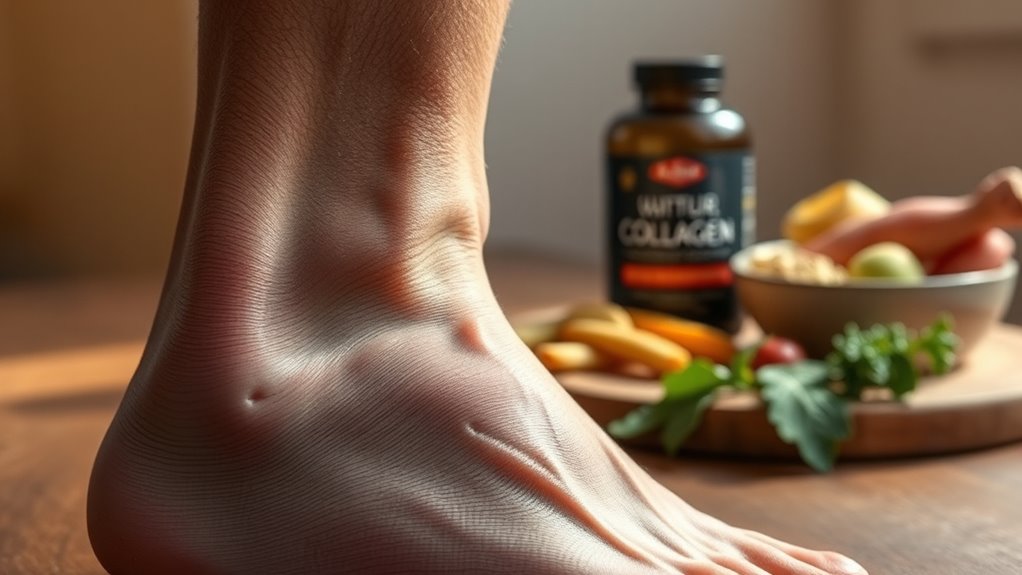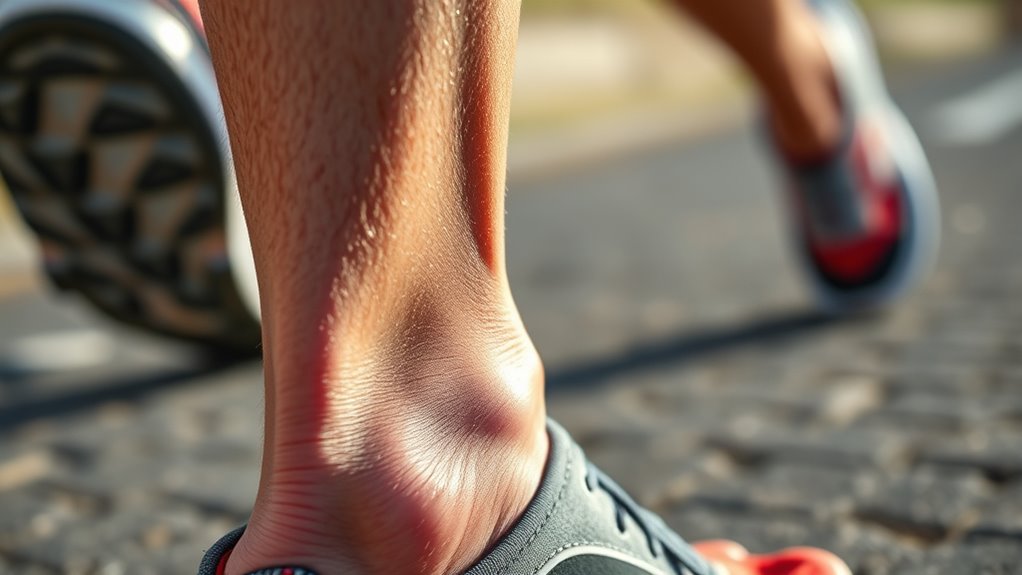Collagen plays a essential role in maintaining your tendons’ strength and flexibility, which are indispensable for high-mileage running. It provides the structural support needed to withstand repetitive stress and prevent injuries. As you train more, supporting collagen production through proper nutrition, recovery, and targeted exercises helps keep your tendons resilient. Continuing with effective strategies will show you how to optimize your tendon health for long-term performance and injury prevention.
Key Takeaways
- Collagen is the primary protein providing structural strength and elasticity to tendons, essential for high-mileage runners.
- Adequate collagen synthesis maintains tendon resilience, reducing injury risk during repetitive running stresses.
- Supporting collagen production through nutrition and supplements enhances tendon durability and recovery.
- Collagen fibers are continuously remodeled, which is vital for adapting to increased training loads in runners.
- Aging and overuse can impair collagen synthesis, weakening tendons without proper nutritional and recovery strategies.
Understanding Tendon Structure and Function

Tendons are strong, fibrous tissues that connect muscles to bones, enabling movement and stability. Your tendon structure is influenced by genetic predispositions, which can affect their strength and resilience. Some people naturally have denser, more robust tendons, reducing injury risk, while others may be more prone to strains. Environmental factors also play a role, including activity levels, training intensity, and exposure to repetitive stress. Overuse or improper technique can weaken tendons over time, making them more susceptible to injury. Understanding how these factors impact tendon function helps you appreciate why some runners are more vulnerable than others. Maintaining healthy habits and recognizing your genetic and environmental influences can help preserve tendon integrity and support long-term performance. Additionally, high-quality training gear and proper technique can further reduce strain on tendons, promoting their health and longevity. Engaging in preventive exercises can also strengthen tendons and improve their ability to withstand repetitive stresses. Moreover, advancements in biomechanical analysis are enabling more precise identification of risk factors for tendon injuries.
The Science Behind Collagen’s Role in Tendon Strength

Collagen is the primary structural protein that gives tendons their strength and durability. Its role relies heavily on collagen synthesis, which maintains and repairs the collagen fibers necessary for healthy tendons. When you run or train extensively, your tendons experience repeated stress, influencing their biomechanics. Collagen provides tensile strength, enabling tendons to withstand these forces without injury. The process of collagen synthesis involves cells called fibroblasts producing new collagen fibers, which align along the direction of stress to optimize tendon biomechanics. This continuous remodeling is vital for maintaining tendon resilience. When collagen production slows or becomes imbalanced, tendons weaken, increasing injury risk. Understanding this science highlights the importance of supporting collagen synthesis through nutrition and recovery for high-mileage runners aiming to keep their tendons strong. Additionally, factors such as collagen synthesis can be influenced by lifestyle choices, making it essential to adopt strategies that promote optimal collagen production.
How High Mileage Impacts Tendon Health

Running high mileage repeatedly stresses tendons, which can lead to cumulative wear and tear over time. As you age, the aging effects on collagen synthesis become more pronounced, making tendons less resilient. This increased vulnerability raises the risk of overuse injuries like tendinitis or tears. High mileage without proper recovery can accelerate these effects, undermining injury prevention efforts. Your tendons lose their elasticity and strength as collagen production slows, making them less capable of handling repetitive stress. To protect your tendons, it’s essential to monitor mileage, incorporate rest days, and support collagen health through proper training. Recognizing how high mileage impacts tendon health helps you adjust your running routine proactively, reducing injury risk and supporting long-term durability. Additionally, understanding the role of collagen in tendon repair can guide targeted nutritional strategies to maintain tendon strength. Maintaining optimal collagen levels through diet and supplementation can also enhance tendon resilience and recovery.
Nutritional Strategies to Support Collagen Production

To enhance collagen production, focus on incorporating collagen-rich foods like bone broth, fish, and eggs into your diet. Supplements such as collagen powders or capsules can also help, but paying attention to the right dosage is key. Understanding how to balance these strategies ensures your tendons stay healthy and resilient. Additionally, maintaining overall system security and being aware of potential vulnerabilities can support your long-term health and performance. Consuming protein-rich foods is essential, as they provide the amino acids necessary for collagen synthesis, further strengthening your tendons. Choosing high-quality nutrient-dense foods can optimize your body’s ability to produce collagen effectively.
Collagen-Rich Foods
Incorporating collagen-rich foods into your diet is a practical way to support tendon health. Foods like bone broth, chicken skin, fish skin, and gelatin are excellent sources of dietary collagen, providing your body with the building blocks it needs to produce more collagen naturally. Including these in your meals can help improve tendon strength and flexibility over time. While collagen supplements are popular, focusing on whole foods guarantees you also get other beneficial nutrients that support collagen synthesis. Eating a variety of collagen-rich foods not only boosts collagen levels but also enhances overall joint and tissue health. Consistent intake may help high-mileage runners maintain resilient tendons and reduce injury risk. Supporting collagen production through proper nutrition can optimize tissue repair and maintain long-term tendon health.
Supplements and Dosage
Supplements aimed at supporting collagen production can be an effective addition to your nutritional strategy, especially when used alongside collagen-rich foods. To maximize collagen absorption, consider taking collagen supplements on an empty stomach or with vitamin C-rich foods, which enhance synthesis. Consistent supplement timing is key—taking collagen around your workouts or at specific times during the day can improve results. Look for hydrolyzed collagen peptides, as they’re easier for your body to digest and absorb. The recommended dosage typically ranges from 2.5 to 10 grams daily, but check product instructions and consult with a healthcare professional for personalized advice. Combining proper timing with a balanced diet helps guarantee your body can effectively utilize collagen for tendon health and recovery.
The Importance of Recovery and Tendon Repair

Recovery and tendon repair are essential for restoring strength and preventing future injuries. When you rest and allow your body to heal, you give your tendons the opportunity to rebuild damaged collagen fibers. Collagen supplementation can support this process, providing the building blocks your body needs for effective tendon repair. Prioritizing proper recovery helps reduce inflammation and tissue breakdown, which are critical for tendon injury prevention. Avoid pushing through pain, as this can delay healing and increase the risk of chronic issues. Incorporate rest days, gentle stretching, and proper nutrition to optimize your body’s natural repair mechanisms. By giving your tendons the time they need to recover, you enhance their resilience and lower the chances of setbacks on your high-mileage running journey.
Supplements and Lifestyle Choices for Tendon Resilience

You can boost your tendon resilience by choosing the right dietary collagen sources and optimizing your exercise and recovery routines. Incorporating collagen-rich foods and proper rest helps support tendon strength over time. Small lifestyle changes can make a significant difference in maintaining healthy, durable tendons.
Dietary Collagen Sources
Consuming dietary sources of collagen can play a crucial role in supporting tendon health and resilience. Foods rich in collagen, such as bone broth, fish, and poultry skin, provide amino acids essential for collagen synthesis. Pairing these with dietary antioxidants—found in berries, nuts, and vegetables—helps protect tendons from oxidative stress, promoting repair and longevity. Including collagen-rich foods regularly can supply the building blocks your body needs to maintain and rebuild tendon tissues. While the direct impact varies, a nutrient-dense diet that supports collagen synthesis is essential for high-mileage runners seeking tendon resilience. Remember, combining dietary collagen sources with antioxidants enhances overall tendon health, reducing injury risk and supporting sustained performance.
Exercise and Recovery Strategies
Incorporating targeted exercise routines and strategic lifestyle choices can substantially boost tendon resilience. Prioritize proper hydration, as water is essential for collagen synthesis and tendon repair. Incorporate stretching techniques that enhance flexibility and reduce injury risk, such as dynamic stretches before runs and static stretches afterward. Consistent stretching helps maintain the tendons’ elasticity, preventing strain during high-mileage training. Avoid overtraining by allowing adequate recovery time, which promotes tissue healing and reduces inflammation. Strengthening exercises, especially those focusing on eccentric loading, can improve tendon strength and resilience. Remember, a balanced approach combining hydration, proper stretching, and smart recovery strategies will support your tendons’ ability to withstand the demands of high-mileage running, helping you stay durable and injury-free.
Practical Tips for Maintaining Tendon Health During Peak Training

Maintaining tendon health during peak training requires proactive strategies to prevent injury and support recovery. Incorporate collagen supplements into your routine to supply the building blocks for tendon repair. Focus on tendon strengthening exercises like eccentric loading and resistance work to enhance resilience. Prioritize proper warm-ups and cooldowns to reduce strain on your tendons. Additionally, listen to your body—rest if you feel pain or excessive fatigue. Consistency is key; maintaining these habits helps your tendons adapt and stay healthy under increased mileage. Remember, small daily efforts make a big difference in preventing setbacks and ensuring sustained performance. By combining collagen intake, targeted exercises, and mindful training, you support your tendons to withstand the demands of peak training phases.
Frequently Asked Questions
Can Collagen Supplements Prevent Tendon Injuries in Runners?
You might wonder if collagen supplements can prevent tendon injuries. While some studies suggest proper nutritional timing and collagen absorption can support tendon repair, they aren’t guaranteed preventatives. Consuming collagen-rich foods or supplements around workouts may boost your body’s ability to maintain tendon strength. However, combining this with a balanced diet, smart training, and adequate recovery offers the best chance to reduce injury risk and support your running longevity.
How Does Age Affect Collagen Production in Tendons?
Imagine your tendons as sturdy ropes slowly fraying over time. Aging effects cause collagen decline, making your tendons less resilient and more prone to injury. As you age, your body’s natural collagen production decreases, weakening the structural support needed for running. This decline means you might notice more soreness and longer recovery times. To keep your tendons strong, consider collagen-rich foods or supplements to help counteract these aging effects.
Are There Specific Types of Collagen Beneficial for Tendon Repair?
You should focus on specific collagen types, like type I and type III, which are essential for tendon repair. Dietary sources such as bone broth, fish, and chicken provide these beneficial collagen types. Consuming these foods helps supply your body with the building blocks needed for tendon health. Incorporating a variety of these sources into your diet supports faster recovery and stronger tendons, especially if you’re a high-mileage runner.
What Are Early Signs of Tendon Overuse or Damage?
Think of your tendons as warning sirens that sound early when you’re overdoing it. Signs of tendon overuse or damage include tendon inflammation, tenderness, and swelling around the area. You might notice stiffness or a dull ache during or after activity. Ignoring these signals can lead to more serious injury, so pay attention to these overuse warning signs and rest when needed to keep your tendons healthy and strong.
How Do Gender Differences Influence Tendon Collagen Health?
Gender differences influence your tendon collagen health through hormonal impacts and genetic factors. Women, due to estrogen, may experience variations in collagen synthesis, affecting tendon strength and repair. Men typically have higher baseline collagen levels, offering potentially greater resilience. Understanding these differences helps you tailor training and recovery strategies, ensuring your tendons stay healthy and avoid injury. Recognizing the hormonal and genetic influences allows you to optimize performance and longevity in high-mileage running.
Conclusion
Keep pushing your limits, but don’t forget to care for your tendons. While high mileage boosts your running goals, neglecting collagen support can lead to setbacks. Think of your tendons as the sturdy cables holding up your passion; neglect them, and your progress may unravel. Balance intense training with proper nutrition and recovery, turning your dedication into longevity. After all, strength isn’t just about miles — it’s about maintaining resilience for every step ahead.









